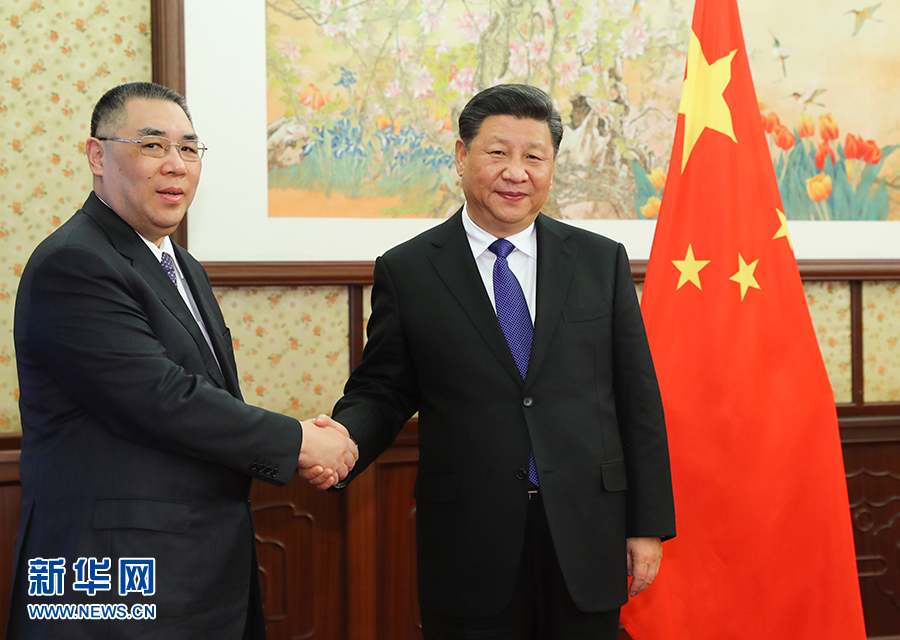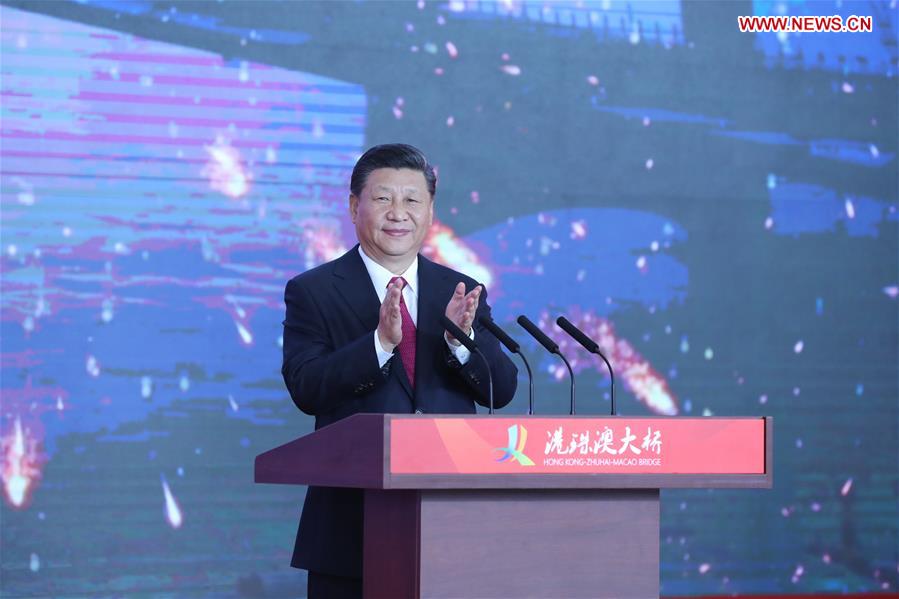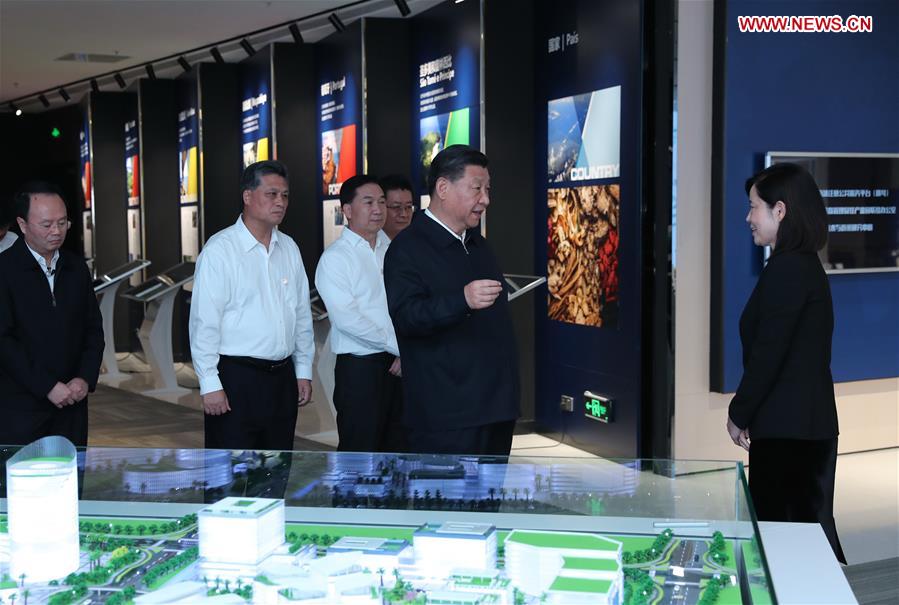Xi and his firm support for Macao's prosperity, stability
Over the years, the CPC Central Committee with Comrade Xi Jinping at the core has unswervingly implemented the policies of "one country, two systems," "the people of Macao governing Macao," and a high degree of autonomy for the region, and has firmly supported the exercising of law-based governance by the chief executive and government of the Macao SAR as well as integration of Macao's development into that of the country.
President Xi Jinping is scheduled to arrive in Macao on Wednesday for the 20th anniversary of Macao's return to the motherland.
Xi, also general secretary of the Communist Party of China (CPC) Central Committee and chairman of the Central Military Commission, is expected to attend a ceremony marking the anniversary, which falls on Dec. 20, and the inauguration of the fifth-term government of the Macao Special Administrative Region (SAR). He will also inspect the region.
Over the years, the CPC Central Committee with Comrade Xi Jinping at the core has unswervingly implemented the policies of "one country, two systems," "the people of Macao governing Macao," and a high degree of autonomy for the region, and has firmly supported the exercising of law-based governance by the chief executive and government of the Macao SAR as well as integration of Macao's development into that of the country.
Guided by this support, Macao has shown the world the success of "one country, two systems" with Macao characteristics.

President Xi Jinping meets with Chief Executive of the Macao Special Administrative Region Chui Sai On in Beijing on Dec. 17, 2018. [Photo/Xinhua]
Support for Macao
A city with only around 30 square km of land and a 670,000-strong population, Macao nevertheless enjoys significant attention from the central authorities.
In December 2012, not long after being elected general secretary of the CPC Central Committee, Xi met with Macao SAR Chief Executive Chui Sai On in Beijing and expressed his full confidence in Macao's development prospects.
Xi on various occasions gave policy directions for Macao: integrate into the country's development, nurture new growth drivers, promote appropriately diversified and sustainable economic development, prioritize economic development and livelihood improvement.
Meeting Chui who was on a duty visit to Beijing in December 2015, Xi said the central authorities attach great importance to Macao's prosperity and stability.
Support was given to Macao in building the region into a world center of tourism and leisure as well as a platform for commercial and trade cooperation between China and Portuguese-speaking countries.
Macao was also encouraged to boost the sectors of conferences and exhibitions, traditional Chinese medicine, education services and cultural creation.
Limited land area has long been a bottleneck of Macao's development.
In December 2014, Xi announced the central authorities' decision to start working on the demarcation of Macao's maritime waters.
According to a map released by the central government a year later, an 85-square-km sea area shall be administered by the Macao SAR.
Macao's development space has also expanded over the years as it kept integrating its development into the country's development blueprint such as the Belt and Road Initiative (BRI) and the Guangdong-Hong Kong-Macao Greater Bay Area (GBA).
In October 2018, Xi came to Zhuhai, the mainland city closest to Macao, to announce the opening of the Hong Kong-Zhuhai-Macao Bridge.
Xi has also written letters to university administrators, elementary school pupils and elderly care center volunteer workers in Macao, expressing the hope that they pass on fine patriotic traditions.

President Xi Jinping announces the opening of the Hong Kong-Zhuhai-Macao Bridge at an opening ceremony in Zhuhai, South China's Guangdong province, Oct 23, 2018. [Photo/Xinhua]
"One country, two systems" with Macao characteristics
The CPC Central Committee with Comrade Xi Jinping at the core has made a series of discourses on "one country, two systems."
Xi has stressed both adhering to the "one country" principle and respecting the differences of the "two systems" at the 15th anniversary of Macao's return to the motherland.
People in Macao have kept a firm hold of the core requirement that the "one country" is the prerequisite and basis of the "two systems," and have opened new prospects for the successful practice of "one country, two systems" with Macao characteristics.
A series of campaigns have been carried out by Macao since 2015 to ensure China's Constitution is well respected, observed and safeguarded in the SAR.
The Macao SAR has used its legislative power to safeguard national security and unity. In 2018, the Macao SAR Safeguarding National Security Commission, headed by the chief executive, was established.
More than just stable, Macao has achieved an economic miracle.
Macao's gross domestic product surged to 444.7 billion patacas in 2018 (about 55 billion U.S. dollars) from around 51.9 billion patacas in 1999, with the unemployment rate dropping to 1.8 percent.
Patriotism is a core social value. The national flag flies high at all levels of educational institutions in Macao, from primary schools to colleges and universities.
In September, meeting with the newly elected fifth-term chief executive of the Macao SAR Ho Iat Seng in Beijing, Xi said "one country, two systems" has proven to be workable and enjoys popular support.
Macao has shown the world a successful practice of "one country, two systems" with Macao characteristics, Xi said.

President Xi Jinping, also general secretary of the Communist Party of China Central Committee and chairman of the Central Military Commission, visits the Traditional Chinese Medicine Science and Technology Industrial Park of Co-operation between Guangdong and Macao in Zhuhai, south China's Guangdong province, Oct 22, 2018. [Photo/Xinhua]
Together for brighter future
People in Macao know that the future of Macao and the mainland are closely linked together.
Xi also spoke of the common progress and shared development between Macao and the mainland when he met with Chui in Beijing in December 2013.
On the one hand, Macao is expected to play its unique role and actively participate in the country's initiatives such as the BRI. On the other hand, key measures have been rolled out to support Macao's development.
The 19th CPC National Congress report, for example, mentioned giving priority to the development of the GBA, cooperation between Guangdong, Hong Kong and Macao, and regional cooperation in the pan-Pearl River Delta.
The outline development plan for the GBA designates Macao as one of the four core cities in the bay area, along with Hong Kong, Guangzhou and Shenzhen.
Hengqin in the city of Zhuhai is being developed as a model zone for Guangdong-Macao cooperation.
In October 2018, Xi visited a traditional Chinese medicine industrial park there and said the original goal of establishing Hengqin new area was to create conditions for the diversified development of Macao's economy.
Xi called for more policy support for developing new industries to help Macao's economy gain greater vitality.
Then came four state-level key laboratories, a youth business incubator, support for collaboration between Macao and mainland universities, border-crossing facilitation and major transport infrastructure projects, with more developments in the pipeline.
Twenty years after returning to the motherland, Macao stands ready to achieve even greater development.
Xi expressed his confidence in common progress when he spoke at a reception celebrating the 70th anniversary of the founding of the People's Republic of China in late September.
He said: "We are confident that with the full backing of the motherland and the concerted efforts of our compatriots in Hong Kong and Macao who love the motherland as well as their communities, Hong Kong and Macao will prosper and progress alongside the mainland and embrace an even brighter future!"

